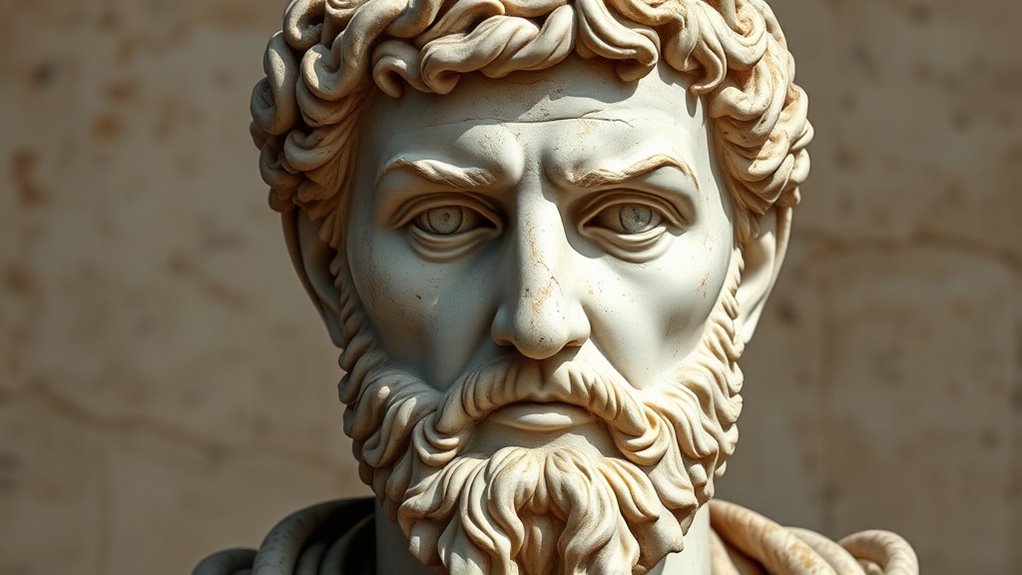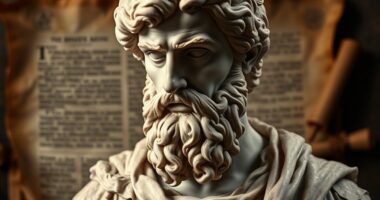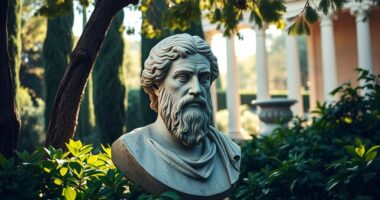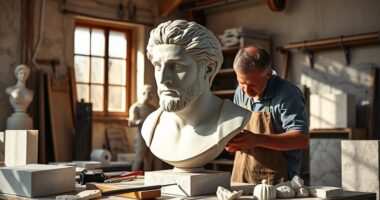Marcus Aurelius was a Roman emperor known for his Stoic philosophy and leadership rooted in virtue, resilience, and moral discipline. Despite facing wars, political turmoil, and personal losses, he maintained calm and self-control, guided by his reflections in *Meditations*. His life emphasizes inner strength, justice, and humility, inspiring future leaders and thinkers. If you’re curious, you’ll discover how his legacy continues to influence ideas on wisdom, virtue, and leadership today.
Key Takeaways
- Marcus Aurelius was a Roman Emperor and Stoic philosopher known for his moral integrity and leadership during turbulent times.
- He authored *Meditations*, a seminal work on Stoic philosophy emphasizing self-control, virtue, and inner peace.
- His leadership was guided by Stoic principles, prioritizing justice, humility, and service over personal gain.
- Despite facing military threats and personal hardships, he demonstrated resilience, calmness, and philosophical reflection.
- His legacy influences modern leadership and ethical living, inspiring resilience, self-awareness, and moral integrity.
The Early Life and Background of Marcus Aurelius
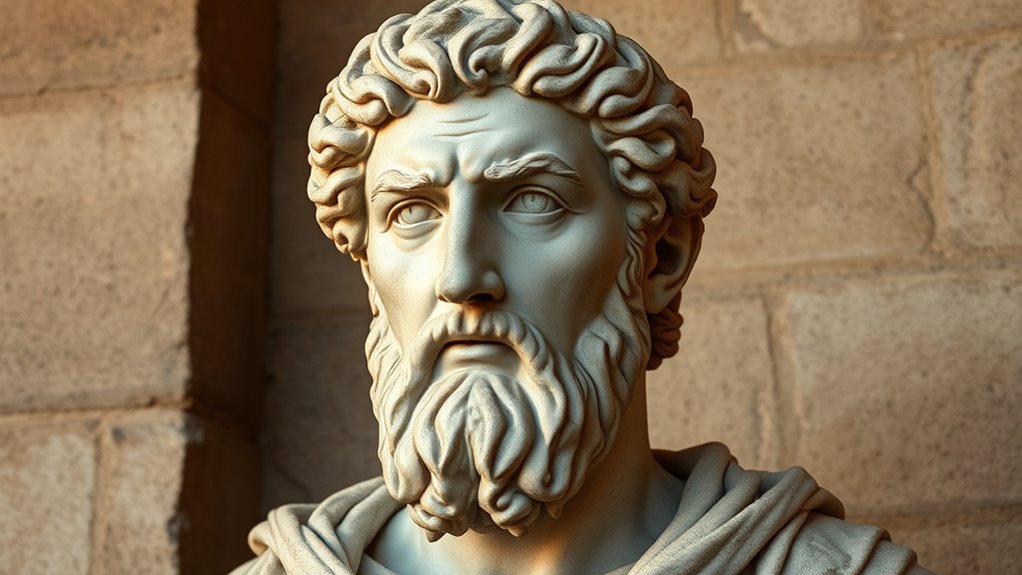
Marcus Aurelius was born in 121 CE into a well-to-do Roman family that valued education and virtue. From a young age, you’re introduced to a household that emphasizes learning, ethics, and self-discipline.
His grandfather, Antoninus, played a key role in shaping his character, ensuring he received a solid education in philosophy, rhetoric, and law. As a boy, you’d have experienced privileged access to teachers and mentors, fostering a deep curiosity about life and virtue. This early immersion in philosophical studies helped develop his reflective nature and moral outlook. Additionally, the family’s emphasis on moral education during his upbringing helped shape his enduring commitment to Stoic principles.
His family’s status provided stability, allowing him to focus on developing wisdom and moral strength. These early influences laid the foundation for his later role as emperor and philosopher, instilling in him the values that would define his reign and legacy. In his youth, he was also exposed to ethical teachings, which deeply influenced his worldview and leadership style.
Ascension to Power and Challenges of the Roman Empire
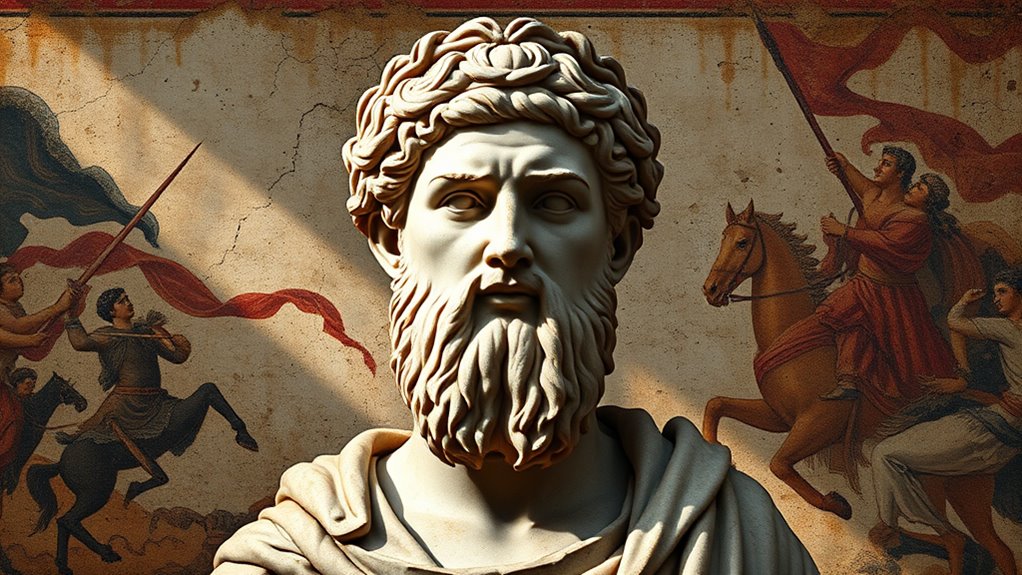
After the death of Emperor Antoninus Pius in 161 CE, a complex power shift unfolded that tested the stability of the Roman Empire. You step into a turbulent era where Marcus Aurelius, chosen as heir, faces immediate challenges. External threats, like Germanic invasions, threaten borders, while internal unrest and political intrigue weaken the empire’s foundations. You must navigate these crises while maintaining authority. Additionally, the AI-driven security systems of the era are limited, making it harder to prevent internal dissent and external invasions. The lack of advanced military technology further complicated efforts to defend the empire effectively.
The Principles of Stoicism and Their Influence on His Reign
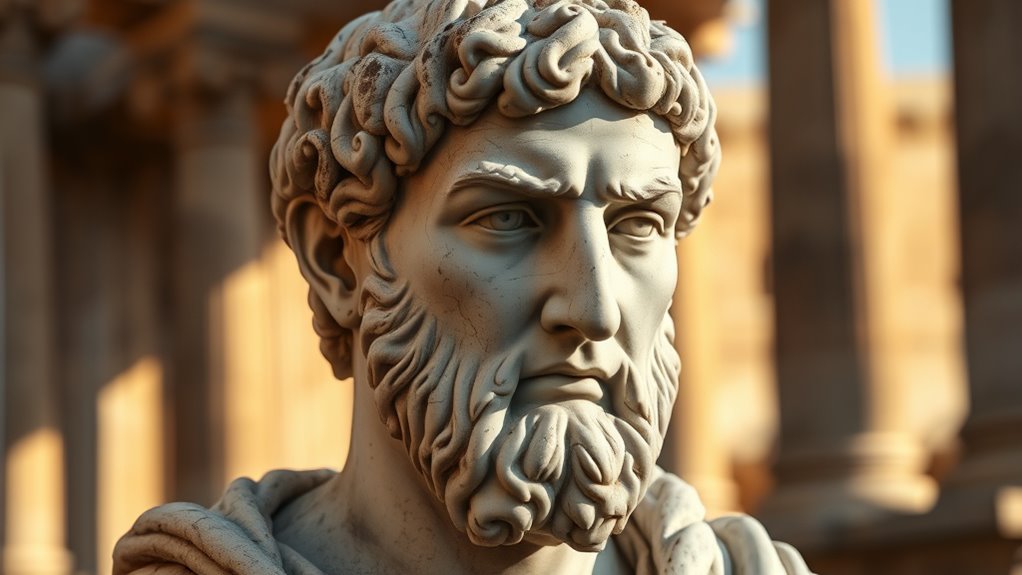
The tumultuous challenges faced during his rise to power tested Emperor Marcus Aurelius’s resilience and leadership. Throughout his reign, he applied Stoic principles to guide his decisions and actions. You’d see him practicing self-control, accepting fate’s hardships without complaint, and prioritizing reason over emotion. His focus on virtue, justice, and wisdom shaped policies that balanced compassion with discipline. Marcus believed that controlling your mind and emotions was essential to leading effectively, especially during crises. He viewed setbacks as opportunities for growth, not defeat. His adherence to Stoicism fostered a sense of calm and purpose, influencing his governance. In doing so, he modeled resilience, humility, and integrity—values that reinforced his authority and left a lasting legacy rooted in Stoic philosophy. Additionally, his commitment to emotional resilience helped him maintain stability during times of upheaval, demonstrating the practical application of Stoic ideals in leadership.
Key Events and Military Campaigns During His Rule
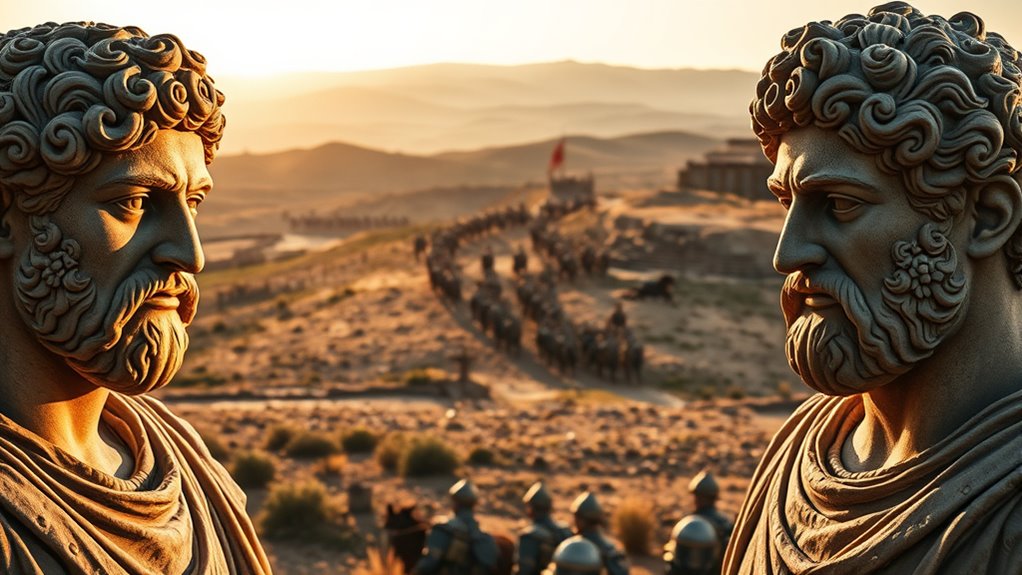
Throughout his reign, Marcus Aurelius confronted numerous military challenges that tested his leadership and strategic skills. One of the most significant was the Marcomannic Wars, where Germanic tribes invaded Roman borders. You’d have overseen defenses along the Danube, personally leading campaigns to push back these incursions. These wars demanded constant vigilance and tactical ingenuity, and your persistence helped stabilize northern frontiers. Moreover, your strategic use of effective storytelling to motivate and unify your troops helped bolster morale during these difficult campaigns. Your ability to adapt and apply personality insights in leadership situations further strengthened your effectiveness as a commander. Additionally, you faced conflicts in the East against the Parthian Empire, which threatened Roman interests in the region. Your ability to coordinate armies and negotiate alliances proved essential in maintaining the empire’s stability. Recognizing the importance of military diplomacy, you often sought peaceful resolutions when possible to preserve resources and lives. Your strategic approach to resource management ensured that the military campaigns were adequately supplied and financially sustainable. In these efforts, your understanding of efficient general ledger coding could have contributed to maintaining accurate financial records for military expenditures, ensuring transparency and proper resource allocation. These military campaigns not only protected Rome’s borders but also reinforced your reputation as a warrior emperor committed to defending the empire’s unity and security.
The Meditations: An Inner Reflection on Virtue and Wisdom
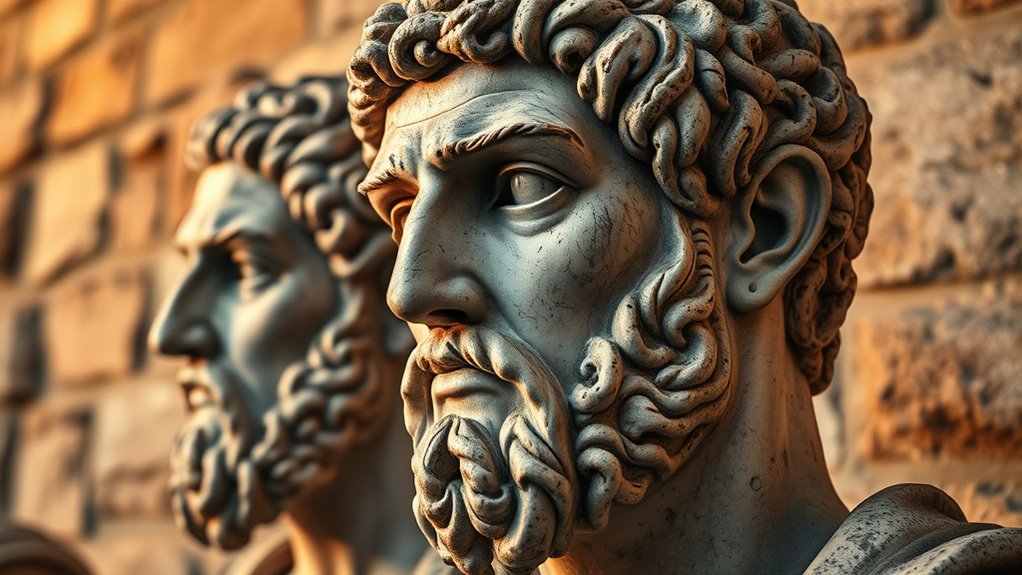
You can see the depth of Marcus Aurelius’s inner life in his writings, particularly in his collection of personal reflections known as the Meditations. In these pages, he examines what it means to live a virtuous life, emphasizing self-discipline, humility, and rationality. Recognizing recurring angel numbers can serve as subtle reminders of the importance of virtue and inner harmony. You notice his constant pursuit of wisdom, always questioning his motivations and actions. The Meditations serve as a guide for how to maintain inner peace amid chaos, reminding you that control over your mind is key. Marcus encourages you to accept what you can’t change and focus on your own responses. His honest, unfiltered thoughts reveal a man committed to personal growth and moral integrity, making his reflections timeless lessons on virtue and wisdom. Cultivating inner harmony was essential for him to lead a balanced life, even amid the responsibilities of empire. By reflecting on his own thoughts and emotions, Marcus exemplified the importance of emotional regulation in achieving true tranquility. Additionally, his focus on mindfulness helps in understanding how to remain present and composed despite external pressures. Embracing such self-awareness can deepen your understanding of yourself and support your journey toward personal development.
Personal Hardships and Resilience in the Face of Adversity
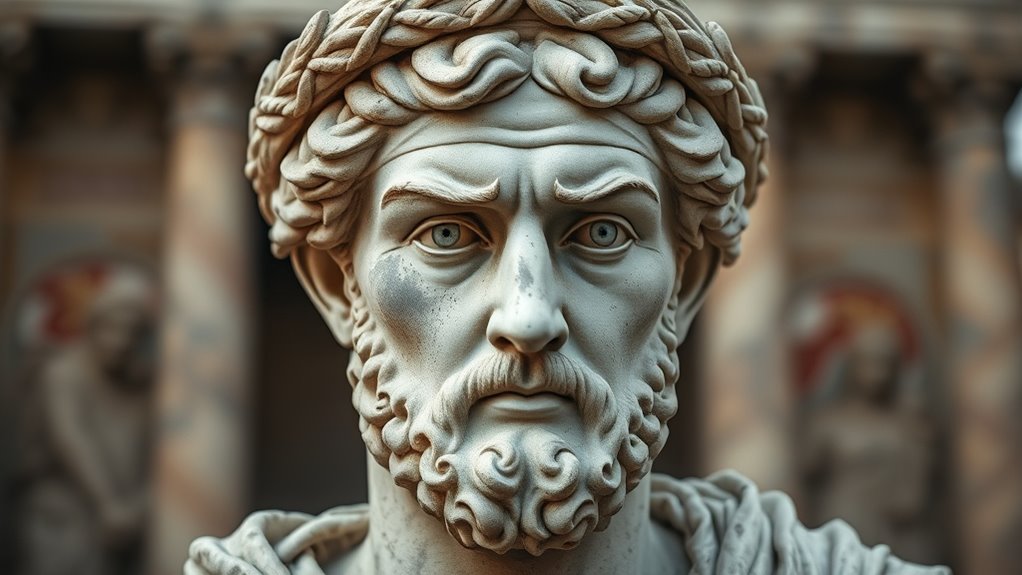
When facing personal hardships, you have the chance to build resilience and inner strength. Marcus Aurelius showed that enduring trials with stoic calm helps you grow stronger, not weaker. Inspiration from his life demonstrates that developing mental fortitude can lead to lasting personal growth. Recognizing the importance of emotional resilience, he emphasized maintaining equanimity regardless of external circumstances. Cultivating positive thinking techniques can also teach patience and precision, reinforcing the value of perseverance in challenging times. Additionally, understanding spinal alignment and proper rest can support overall well-being during tough periods.
Enduring Personal Trials
Despite facing numerous personal hardships, Marcus Aurelius demonstrated remarkable resilience rooted in his Stoic philosophy.
You see, he endured the loss of loved ones, including his children and wife, yet remained grounded and composed. When illness struck, he refused to let it break his spirit, instead viewing it as an opportunity to practice patience and acceptance.
His responsibilities as emperor brought constant stress, yet he kept his focus on duty and virtue. Rather than succumb to despair, he confronted each challenge with calm resolve, understanding that suffering is part of life.
His perseverance wasn’t blind; it was guided by a clear understanding that hardships are inevitable, and how you respond to them defines your character.
Marcus’s ability to endure personal trials inspires you to face adversity with resilience.
Cultivating Inner Strength
Cultivating inner strength requires intentionally developing resilience through facing personal hardships head-on. When you confront adversity directly, you learn to manage your emotions and maintain focus. Instead of avoiding difficulties, see them as opportunities to grow stronger. Recognizing that dreams often carry symbolic meanings can enhance your understanding of challenges and guidance in life. Marcus Aurelius believed that challenges are essential for building character and wisdom. By adopting this mindset, you develop patience and mental toughness. Reflect on setbacks as lessons rather than failures. Practice self-discipline and stay committed to your values, even when circumstances are tough. Resilience doesn’t mean ignoring pain but understanding it and using it to fuel your growth. Developing a growth mindset helps you view setbacks as essential for personal development. This attitude can also be supported by understanding the benefits of resilience, which strengthen your capacity to face future obstacles. Over time, this approach helps you become more resilient, confident, and better equipped to handle whatever life throws your way.
Leadership Style and His Approach to Governance
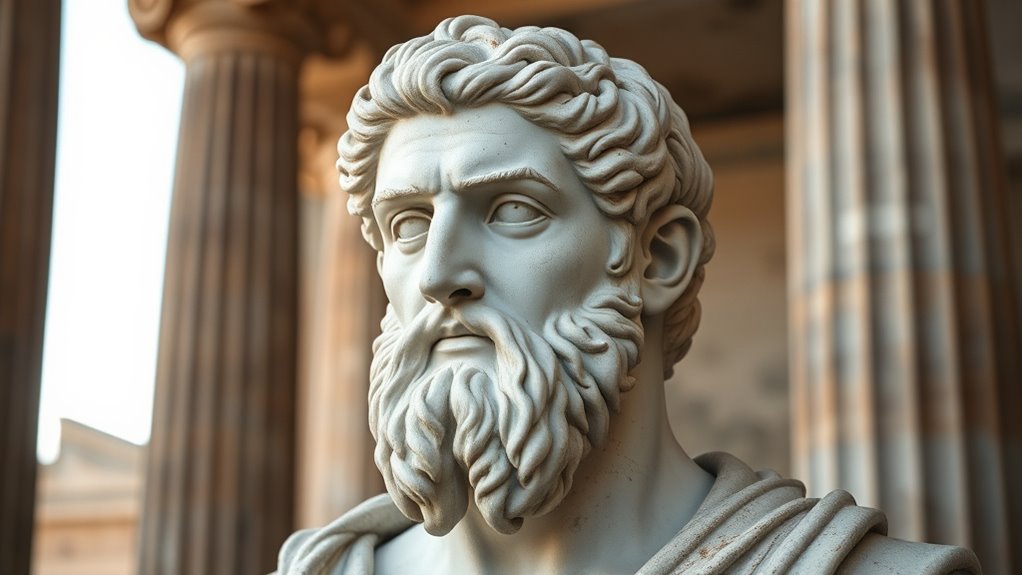
Marcus Aurelius’s leadership was deeply rooted in Stoic principles, shaping his approach to governance with a focus on reason, self-discipline, and virtue. He believed that a ruler’s duty was to serve with justice and humility, prioritizing the common good over personal gain. This is reflected in his decision-making, which emphasized rationality and moral integrity. You’ll notice that he often sought counsel and reflected before acting, demonstrating his commitment to self-improvement. His leadership style can be summarized as:
| Trait | Approach | Impact |
|---|---|---|
| Rationality | Decisions based on logic and virtue | Fair, consistent governance |
| Humility | Admitted mistakes, prioritized service | Trust and respect gained |
| Self-discipline | Maintained personal integrity | Led by example |
| Compassion | Cared for citizens’ well-being | Strengthened unity |
The Philosophical Legacy of Marcus Aurelius
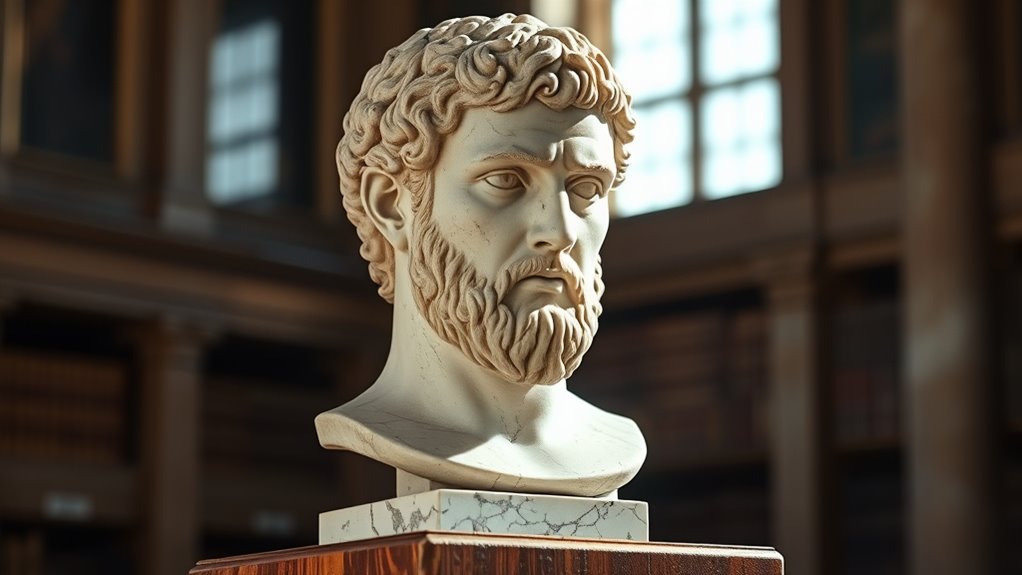
The philosophical legacy of Marcus Aurelius endures through his writings, most remarkably his personal journal known as *Meditations*. This work offers profound insights into his Stoic beliefs, emphasizing self-discipline, rationality, and acceptance of life’s challenges.
You can see how he practiced mindfulness and inner resilience, even amid chaos and suffering. His reflections encourage you to focus on what’s within your control and to approach others with compassion and understanding.
Marcus’s ideas remain relevant today, inspiring personal growth and ethical living. His writings serve as a guide to developing mental strength, humility, and moral integrity.
How His Reign Influenced Future Thinkers and Leaders
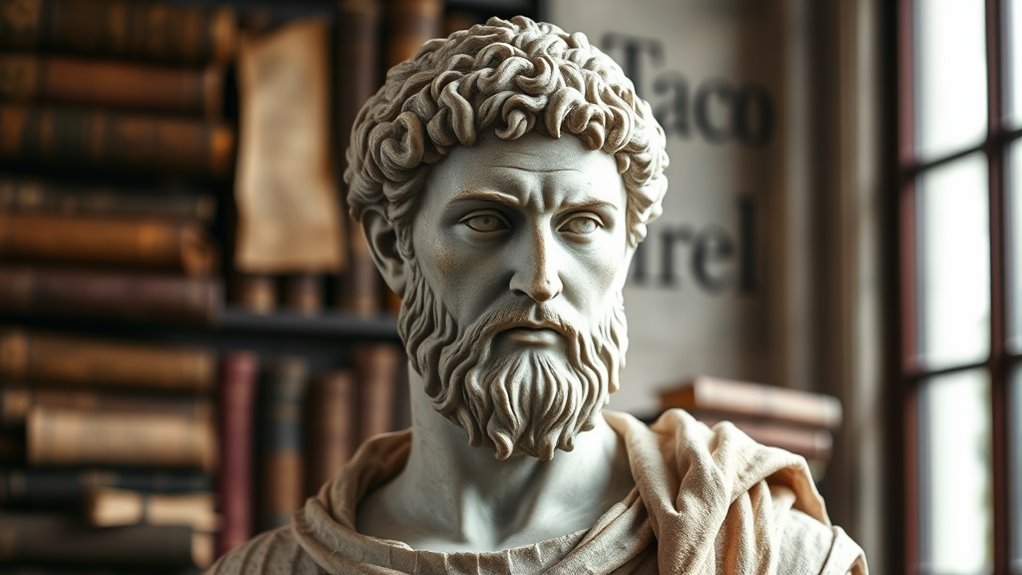
His philosophical insights and leadership style left a lasting mark on future thinkers and leaders. You can see his influence in the way many approach governance with humility and resilience. Marcus’s emphasis on self-discipline, integrity, and service became foundational for leaders seeking to lead with purpose and moral clarity.
His practice of reflection and acceptance of challenges inspired others to develop mental toughness and emotional stability. You might notice his legacy in modern leadership principles that prioritize ethical decision-making and the well-being of others.
Many influential figures, from political leaders to business executives, cite his writings and ideas as guiding principles. His example encourages you to face adversity with calm resolve and to lead by example, promoting a legacy of virtue that endures across centuries.
The Enduring Impact of Marcus Aurelius on Philosophy and Leadership
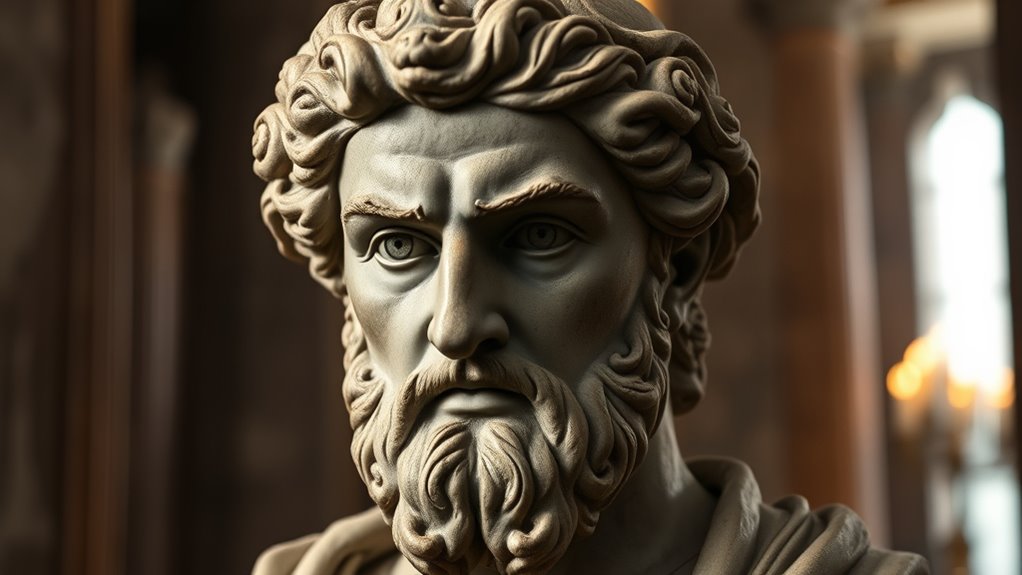
Despite living nearly two millennia ago, Marcus Aurelius’s teachings continue to shape contemporary philosophy and leadership practices. His emphasis on self-discipline, resilience, and virtue remains relevant today.
You can see his influence in modern leadership styles that prioritize ethical behavior and emotional intelligence. His meditations encourage you to remain calm amid chaos, accept what you can’t control, and lead with integrity.
His ideas inspire leaders to foster humility, patience, and empathy. By applying Stoic principles, you develop mental clarity and moral strength that withstand modern challenges.
Marcus Aurelius’s legacy persists in:
- Promoting resilience in adversity
- Emphasizing personal responsibility
- Encouraging ethical decision-making
- Valuing humility and self-awareness
- Cultivating emotional resilience in leadership
Frequently Asked Questions
What Were Marcus Aurelius’s Personal Hobbies and Interests Outside Philosophy?
You want to know Marcus Aurelius’s hobbies and interests beyond philosophy, but his pursuits reveal a man dedicated to discipline, reflection, and service.
He enjoyed reading, writing, and engaging in physical exercise like horseback riding. These activities helped him maintain balance and resilience.
His interests weren’t just leisure; they complemented his Stoic ideals—cultivating strength, wisdom, and self-control—showing a holistic approach to life rooted in growth and discipline.
How Did Marcus Aurelius Handle Internal Dissent Within His Empire?
You see, Marcus Aurelius faced internal dissent with a calm and rational approach. He listened carefully to grievances, often reflecting on their causes through Stoic principles, and sought fair resolutions.
Instead of harsh punishments, he aimed to understand and address the underlying issues. His leadership focused on justice and virtue, which helped maintain stability and foster loyalty among his subjects, even amidst challenges.
Did Marcus Aurelius Have Any Significant Relationships That Influenced His Philosophy?
You might say that Marcus Aurelius’s philosophy was shaped by subtle yet profound relationships, especially with his mentors and close friends. These connections gently guided his thoughts and values, reinforcing his commitment to Stoicism.
His interactions with wise advisors and reflective moments with loved ones helped deepen his understanding of virtue, duty, and resilience.
Ultimately, these relationships influenced his approach to leadership and personal growth.
What Was Marcus Aurelius’s Stance on Emerging Religious Movements of His Time?
You might wonder how Marcus Aurelius viewed new religious movements during his reign. He generally remained tolerant, emphasizing rationality and virtue over dogma.
While he respected traditional Roman gods, he didn’t actively persecute emerging faiths like Christianity or Judaism, focusing instead on maintaining social harmony.
His Stoic philosophy urged understanding and moderation, guiding him to coexist peacefully with diverse beliefs, even if he personally adhered to traditional Roman religious practices.
How Did Marcus Aurelius’s Death Impact the Roman Empire’s Stability?
You see, Marcus Aurelius’s death marked a turning point that affected the empire’s stability. His passing led to a succession challenge, causing internal strife and weakening central authority.
As a result, the empire faced increased threats from external enemies and internal unrest. You might notice that his leadership kept the empire relatively stable, but after his death, the lack of a strong successor created vulnerabilities that made the empire more susceptible to crises.
Conclusion
You see, Marcus Aurelius’s legacy isn’t just about empire and philosophy; it’s about humility in power and strength in virtue. While he faced chaos and conflict, he remained committed to inner peace and wisdom. In a world driven by ambition, he reminds you that true leadership lies in self-awareness and compassion. His life proves that even amidst turmoil, the pursuit of virtue can leave an enduring mark on history—and on you.
